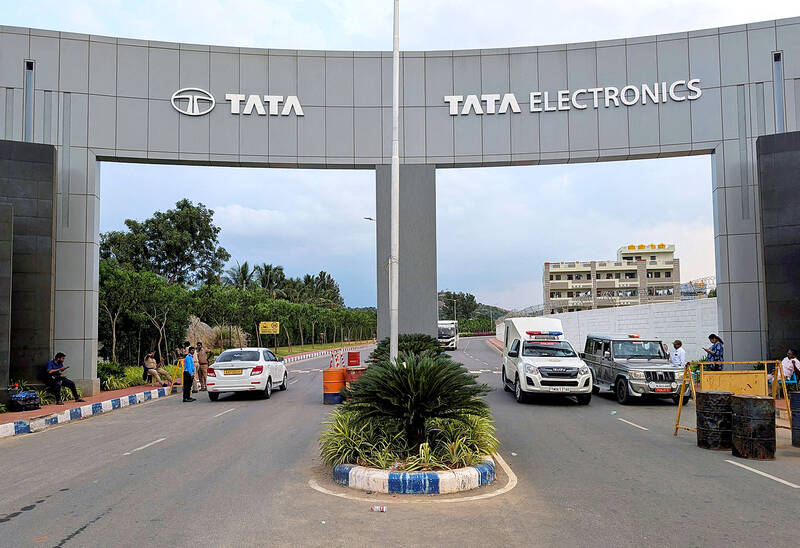An Indian factory producing iPhone components resumed work yesterday after a fire that halted production — the third blaze to disrupt Apple Inc’s local supply chain since the start of last year.
Local industrial behemoth Tata Group’s plant in Tamil Nadu, which was shut down by the unexplained fire on Saturday, is a key linchpin of Apple’s nascent supply chain in the country.
A spokesperson for subsidiary Tata Electronics Pvt yesterday said that the company would restart work in “many areas of the facility today.”

Photo: Reuters
“We’ve been working diligently since Saturday to support our team and to identify the cause of the fire,” the spokesperson said.
The conglomerate did not say when the facility would resume full production or whether the fire would result in shipment delays. Analysts had initially projected a delay in production of older iPhone models.
The fire is the latest incident to affect Apple’s supply chain in India, with two other blazes temporarily halting production at factories owned by Taiwanese suppliers Pegatron Corp (和碩) and Foxlink Group (正崴) last year.
India has been a major beneficiary of Apple’s decision to broaden its production outside of China. The company plans to also start locally manufacturing AirPods, its wireless earphones, at a facility owned by Taiwanese electronics giant Foxconn Technology Group (富士康), the Times of India reported yesterday.
Foxconn, a principal assembler of iPhones, is also in the process of building a major phone assembly plant near Bengaluru, the country’s principal information technology hub.
Other tech companies have followed suit, with Google this year beginning the local manufacture of its flagship Pixel 8 smartphone.
Tamil Nadu, where the Tata factory is based, has worked to cultivate its high-tech manufacturing industry. Tamil Nadu Chief Minister M.K. Stalin concluded a whirlwind tour of the US last month, securing fresh investment commitments worth nearly US$900 million, local media reports said.
Key deals include promises from Finnish tech giant Nokia and payments firm PayPal to set up research and artificial intelligence development centers in the state.

Application-specific integrated circuit designer Faraday Technology Corp (智原) yesterday said that although revenue this quarter would decline 30 percent from last quarter, it retained its full-year forecast of revenue growth of 100 percent. The company attributed the quarterly drop to a slowdown in customers’ production of chips using Faraday’s advanced packaging technology. The company is still confident about its revenue growth this year, given its strong “design-win” — or the projects it won to help customers design their chips, Faraday president Steve Wang (王國雍) told an online earnings conference. “The design-win this year is better than we expected. We believe we will win

Intel Corp chief executive officer Lip-Bu Tan (陳立武) is expected to meet with Taiwanese suppliers next month in conjunction with the opening of the Computex Taipei trade show, supply chain sources said on Monday. The visit, the first for Tan to Taiwan since assuming his new post last month, would be aimed at enhancing Intel’s ties with suppliers in Taiwan as he attempts to help turn around the struggling US chipmaker, the sources said. Tan is to hold a banquet to celebrate Intel’s 40-year presence in Taiwan before Computex opens on May 20 and invite dozens of Taiwanese suppliers to exchange views

Chizuko Kimura has become the first female sushi chef in the world to win a Michelin star, fulfilling a promise she made to her dying husband to continue his legacy. The 54-year-old Japanese chef regained the Michelin star her late husband, Shunei Kimura, won three years ago for their Sushi Shunei restaurant in Paris. For Shunei Kimura, the star was a dream come true. However, the joy was short-lived. He died from cancer just three months later in June 2022. He was 65. The following year, the restaurant in the heart of Montmartre lost its star rating. Chizuko Kimura insisted that the new star is still down

While China’s leaders use their economic and political might to fight US President Donald Trump’s trade war “to the end,” its army of social media soldiers are embarking on a more humorous campaign online. Trump’s tariff blitz has seen Washington and Beijing impose eye-watering duties on imports from the other, fanning a standoff between the economic superpowers that has sparked global recession fears and sent markets into a tailspin. Trump says his policy is a response to years of being “ripped off” by other countries and aims to bring manufacturing to the US, forcing companies to employ US workers. However, China’s online warriors